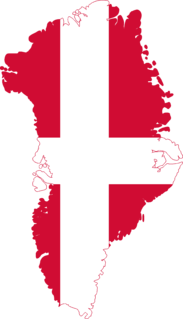
Greenland is an island nation located between the Arctic and Atlantic oceans, east of the Canadian Arctic Archipelago. Greenland is the world's largest island, and one of the three constituent countries that form the Kingdom of Denmark, along with Denmark and the Faroe Islands; the citizens of these countries are all Danish nationals. Greenland is divided into five municipalities: Sermersooq, Kujalleq, Qeqqata, Qeqertalik and Avannaata. The northeast of the island composes the unincorporated Northeast Greenland National Park. Thule Air Base is also unincorporated, an enclave within Avannaata municipality administered by the United States Space Force. Greenland's capital is Nuuk.
The politics of Greenland, an autonomous country within the Kingdom of Denmark, function in a framework of a parliamentary representative democratic dependency, whereby the prime minister is the head of government, and of a multi-party system. Executive power is exercised by the government. Legislative power is vested in both the government and parliament Inatsisartut. The judiciary is independent of the executive and the legislature. Greenland has full autonomy on most matters, except on policies and decisions affecting the region including negotiations with the devolved legislatures and the Folketing.

The defence of Greenland is the responsibility of the Kingdom of Denmark. The government of Greenland does not have control of Greenland's military or foreign affairs. The most important part of Greenland's defensive territory remains the 12 maritime zones. In recent years there has been a significant increase in the presence of new challenges. In the history of Greenland there have been many changes of presence regarding who is in charge of the security of Greenlandic people and its land.

Knud Johan Victor Rasmussen was a Greenlandic–Danish polar explorer and anthropologist. He has been called the "father of Eskimology" and was the first European to cross the Northwest Passage via dog sled. He remains well known in Greenland, Denmark and among Canadian Inuit.

Baffin Bay, located between Baffin Island and the west coast of Greenland, is defined by the International Hydrographic Organization as a marginal sea of the Arctic Ocean. It is sometimes considered a sea of North Atlantic Ocean. It is connected to the Atlantic via Davis Strait and the Labrador Sea. The narrower Nares Strait connects Baffin Bay with the Arctic Ocean. The bay is not navigable most of the year because of the ice cover and high density of floating ice and icebergs in the open areas. However, a polynya of about 80,000 km2 (31,000 sq mi), known as the North Water, opens in summer on the north near Smith Sound. Most of the aquatic life of the bay is concentrated near that region.

The Inuit Circumpolar Council (ICC), formerly Inuit Circumpolar Conference, is a multinational non-governmental organization (NGO) and Indigenous Peoples' Organization (IPO) representing the 180,000 Inuit, Yupik, and Chukchi peoples people living in Alaska, Canada, Greenland, and Chukotka (Russia). ICC was ECOSOC-accredited and was granted special consultative status at the UN in 1983.

Disko Bay is a large bay on the western coast of Greenland. The bay constitutes a wide southeastern inlet of Baffin Bay.
Agnethe Davidsen was a judge who was the first female government minister in Greenland and only the second female mayor of Nuuk, the capital of Greenland, where she was mayor for more than 14 years until she died suddenly at the age of 60.
Lena Pedersen or Lena Pederson is a politician and social worker from Nunavut, Canada. In 1959, she moved from Greenland to the Northwest Territories and lived in Coppermine (Kugluktuk), Pangnirtung and Rae (Behchoko) before moving to Cape Dorset where she participated in the artwork sales of the West Baffin Eskimo Co-operative.

Greenland was a European Parliament constituency for elections in the European Union covering the territory of Greenland. It seceded from the European Community in 1985. It was represented by one Member of the European Parliament.

Johannes Frederik Johnstrup was a Danish professor, geologist and paleontologist. He was the founder of the Danish scientific periodical Meddelelser om Grønland.

Simon Lynge is a singer-songwriter who was raised in Greenland and Denmark.
The Greenland Provincial Council was the provincial government of Greenland between 1950, when it was formed from the union of the earlier North and South Greenland Provincial Councils, and 1 May 1979, when it was replaced by the Greenland Home Rule Government and its Parliament.
Provincial Council elections were held in Greenland for the first time on 29 June 1951, alongside district council elections. Voter turnout was 73%.

Atassut is a liberal-conservative and unionist political party in Greenland. Founded on 29 April 1978, Atassut is an established partner of the Liberal Party of Denmark.
Augustinus "Augo" Telef Nis Lynge was a Greenlandic politician, educator, poet, novelist and Kalaaleq nationalist who was the first Greenlandic representative in the Danish parliament and died during the sinking of the MS Hans Hedtoft.
Finn Lynge was a Greenlandic politician, Indigenous rights activist, priest and civil servant who from 1979 until 1984 was the sole Member of the European Parliament for Greenland. Lynge campaigned for Greenland withdrawal and his seat was abolished when Greenland withdrew from the European Communities.

Nunatta Qitornai is a separatist political party in Greenland advocating independence. It was founded in September 2017 by former Minister of Business, Labour, Trade and Foreign Affairs Vittus Qujaukitsoq, who had previously been in Siumut and who was subsequently elected in the 2018 Greenlandic parliamentary elections. In the 2021 elections the party lost its seat.
Aviâja Egede Lynge is a Greenlandic social anthropologist who actively supports the rights of indigenous Inuit people. In her native Greenland, she has contributed to training teachers to appreciate their cultural identity and their indigenous rights. Since 2015, she has been Greenland's Spokesperson for the Rights of the Child (børnetalsmand), a position she has been invited to maintain until 2025. Since 2020, she has been a member of the General Assembly of the International Indigenous Women’s Forum (FIMI).











